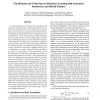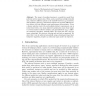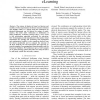498 search results - page 43 / 100 » Learning structured prediction models: a large margin approa... |
CVPR
2010
IEEE
13 years 11 months ago
2010
IEEE
A clustering framework within the sparse modeling and dictionary learning setting is introduced in this work. Instead of searching for the set of centroid that best fit the data, ...
UM
2009
Springer
14 years 2 months ago
2009
Springer
Abstract. Recent sensor technologies have enabled the capture of users’ behavior data. Given the large amount of data currently available from sensor-equipped environments, it is...
PPSN
2010
Springer
13 years 6 months ago
2010
Springer
The target of machine learning is a predictive model that performs well on unseen data. Often, such a model has multiple intended uses, related to different points in the tradeoff ...
JSW
2007
13 years 8 months ago
2007
— The science of physics is based on theories and models as well as experiments: the former structure relations and simplify reality to a degree such that predictions on physical...
MLMI
2007
Springer
14 years 2 months ago
2007
Springer
Abstract. Prosody has been actively studied as an important knowledge source for speech recognition and understanding. In this paper, we are concerned with the question of exploiti...



